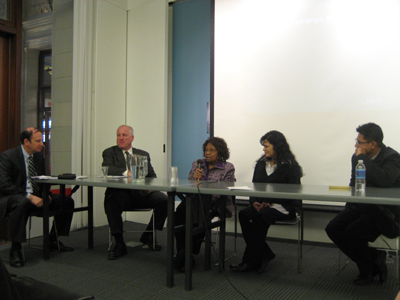In January MPC and the Chicago Architecture Foundation co-hosted The Micro Revolution: Neighbors Making a Difference-Part 2, the second in a two-part roundtable series. This one featured parents and school administrators who have worked to improve the quality and design of their community schools.
When a group of dedicated
people come together, there is little they can't accomplish. In September 2007, MPC and the Chicago
Architecture Foundation co-hosted a roundtable that featured residents who
brought about positive changes in their neighborhoods by putting their ideas and
a little sweat equity into growing community gardens, linking regional bicycle
trails, and raising the roof of a neighborhood health center.
Following the
success of that event, MPC and the CAF joined forces again to co-host The
Micro Revolution: Neighbors Making a Difference-Part 2, on Jan. 24,
2008, with a panel of parents and
administrators who have worked to improve the quality and design of their
community schools.
The panel
was moderated by Henry Webber, the vice president of community and government
affairs at theUniversity of
Chicago
. The panelists were Mildred Swafford, president of Edward K. “Duke”
Ellington
Elementary School Local School Council
(LSC);
Linda Sarate, board member of the Little Village
Community Development Corporation; Trung Le, design director of education at OWP/P; and Robert Guercio,
principal of Alexander Graham Bell School in Lincoln Square.

The panelists all stressed the
importance different groups of people working together, and encouraged citizens
to look for creative solutions to educational issues in their communities.
Mr. Le described how he incorporates
community participation and new technology to design schools around the way
children learn. Principal Guercio
spoke about the parental and community involvement at his school. H e also encouraged educators not
to blindly accept limitations, but rather engage students and community members
to find innovative solutions to problems.
Ms. Swafford and Ms. Sarate
provided personal accounts of school reform in their communities. Ms. Swafford described how she became
involved in the LSC after witnessing the conditions of schools in her
neighborhood. Through her work, and
by cooperation with neighbors and school administrators, Edward K. “Duke”
Ellington
Elementary School was built
in 2005.
Like Ms. Swafford, Ms. Sarate
helped mobilize her community to fight for better schools for their
children. Thanks in part to her
efforts, Little Village Lawndale High School was opened in 2005.
Ms. Sarate summed
up the message of the day by describing how, through a series of seemingly small
steps, she “started to build momentum in a community that was tired of being
disrespected and put aside…[I] helped the community to open their eyes and see
what was going on.”
To listen to an audio recording
of the event, please visit Chicago
Amplified
The Micro-Revolution roundtables
were generously supported by a grant from the National Endowment for the
Arts. For more information, please
contact Peter Skosey, Vice President of External Relations, at 312-863-6004 or
pskosey@metroplanning.org.